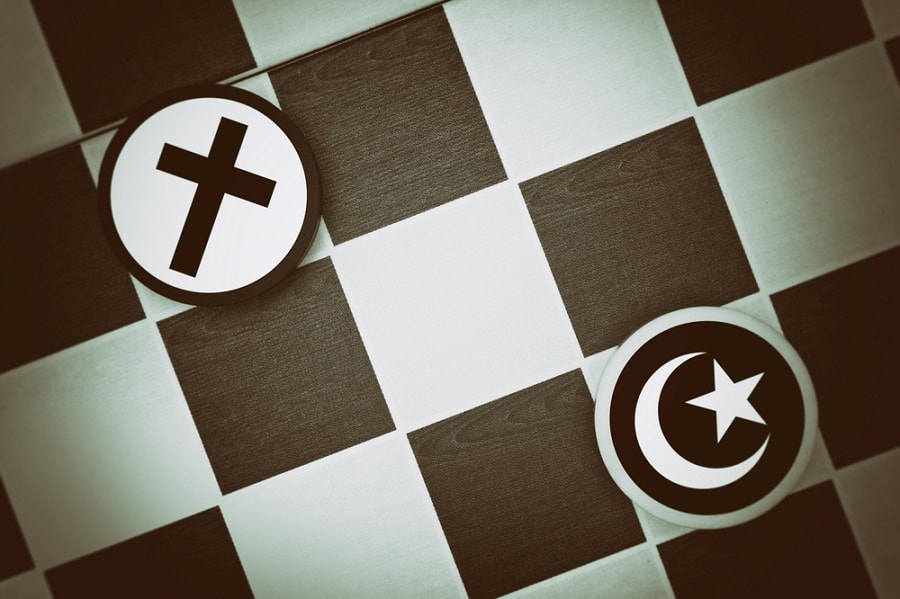It’s certainly not a new concept, but the rise of the Internet and social media have perhaps driven tribalism to unprecedented heights. And as Shakespeare so expertly illustrated, dividing ourselves into factions never ends well. Editor Chad Merchant takes a look at the frightful new age of us versus them.
The legendary American feud of the Hatfields and the McCoys, which ran from 1863 to 1891, has been turned into game shows, theme park musical comedies, a television series, and more U.S. pop culture references than you can count. It’s odd that it’s been so trivialized, but I guess time really does heal all wounds. The actual facts of the long-running feud between two late-19th- century Appalachian families are peppered with hatred, double-crossing, revenge, violence, and murder.
The initial causes were fairly benign: a lingering grudge from a property dispute, an argument about the ownership of a hog, and in an homage to Shakespeare’s doomed young lovers, a forbidden romance between one family’s son and the other’s daughter. Though not many people are familiar with the actual details of the Hatfields and McCoys, the feud itself is well-known enough to have entered America’s folklore lexicon as a metonym for any bitterly feuding rival factions. Despite the catalysts for all this hatred and fighting being fairly petty, by the time all was said and done, 14 people between the two families were dead, along with four supporters.
Parallels can be seen today between the two major political parties in the U.S. Deeply polarized, Democrats and Republicans have retreated into warring faction mode, and the country suffers for it, both domestically and on the world stage. The ‘us versus them’ model has threatened to plunge the country into a new era of simmering class warfare, with the working poor paradoxically having chosen an elitist billionaire as their presumptive saviour.
Here in Malaysia, factions have long existed, largely centred around race or religion. By most accounts, the country has done an admirable job of managing the latent tribalism since its last major eruption in the late ’60s, but increasingly, a half-century later, cracks are beginning to show.
Over in Europe, tribal splintering is threatening to undermine the stability and strength of the EU – or has already done so, depending on who you ask. Casting immigrants and refugees firmly into the ‘them’ camp, a xenophobic nationalism has swept through numerous countries in Europe, pushing the continent to what may ultimately be a crisis not easily contained.
Europe is of course well-acquainted with the effects of tribalism. The Great East-West Schism saw the Catholic Church split into two tribes – Eastern Orthodoxy and Roman Catholicism – nearly a thousand years ago. This long-simmering conflict ruptured in 1054 and persisted for centuries; whether or not it’s ever really been resolved is a difficult question to answer even today.
Six centuries ago, the Great Papal Schism – another split within the Catholic Church – ultimately swept through the continent, growing from an internal church problem to an international diplomatic crisis that splintered Europe into opposing factions, with secular states and leaders forced to align with one claimant or another to the Catholic papacy. It took an ecumenical council of some 600 people four years to resolve the schism and repair the damage it had caused. It wouldn’t last long, though, as the Reformation took hold a century later and again divided people into irreconcilable factions – this time Protestantism was added to the two existing tribes of Christendom.
Though each of these splintering events caused no small amount of pain and conflict, people kept breaking themselves into warring factions. They fought, they campaigned, they debated, they even waged war. Eventually, perhaps they figured out that no one tribe was ever going to ‘win’ – and so decided to just find a way to coexist peacefully instead.
We see this played out today in Islam, too, with its differing factions engaged in ongoing struggles with each other. The major split, long ago, divided adherents into tribes of Sunni, Shi’i, and Khawarij, with centuries of conflict and bloodshed still being played out today. Will they, too, one day learn the painful lesson of tribalism? That the end game is only an illusion: There is never going to be a lone victor. There are no winners.
In Chinese Tao philosophy, one tenet exists of which even many Westerners are aware: the yin and the yang. This concept of duality teaches that supposedly opposing forces, though appearing to be contrary and unable to achieve reconciliation, are in fact complementary and interdependent. This notion of balance and interconnectedness is a lesson mankind desperately needs to learn and practice. Conservatives are never going to stamp out all liberals. The Sunni will not ever be the only Muslims. Roman Catholics will never obliterate the world’s Protestants.
Ultimately, for all our bickering and pettiness, the simple fact is – like the darkness needs the light and the push needs the pull – we all need each other. Our differences are certainly real: just ask the Montagues and Capulets. Or the Hatfields and McCoys. But as countless generations who have come before us have bitterly learned, when we allow those differences to propel us into tribes, with that attendant tribal mentality, we engage in a zero-sum game which we all lose.
A version of this article was originally published in The Expat magazine (August 2017) which is available online or in print via a free subscription.



















